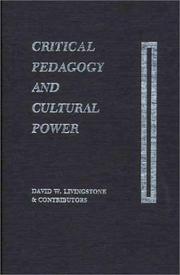| Listing 1 - 4 of 4 |
Sort by
|

ISBN: 0897891120 0897891163 9780897891165 9780897891127 Year: 1987 Publisher: Bergin and Garvey
Abstract | Keywords | Export | Availability | Bookmark
 Loading...
Loading...Choose an application
- Reference Manager
- EndNote
- RefWorks (Direct export to RefWorks)
Book
ISBN: 162396525X 9781623965259 9781617355745 1617355747 9781623961640 1623961645 9781623965235 1623965233 9781623965242 1623965241 Year: 2014 Publisher: Charlotte, NC
Abstract | Keywords | Export | Availability | Bookmark
 Loading...
Loading...Choose an application
- Reference Manager
- EndNote
- RefWorks (Direct export to RefWorks)
Social sciences --- Social science teachers --- Critical pedagogy --- Social science literature --- Social studies teachers --- Teachers --- Study and teaching --- Training of --- Critical pedagogy -- United States. --- Social science teachers -- Training of -- United States. --- Social sciences -- Bibliography. --- Social sciences -- Study and teaching -- United States.
Book
ISBN: 9400739737 9400797486 9786613709332 1280798947 9400739745 Year: 2012 Publisher: Dordrecht [Netherlands] : Springer,
Abstract | Keywords | Export | Availability | Bookmark
 Loading...
Loading...Choose an application
- Reference Manager
- EndNote
- RefWorks (Direct export to RefWorks)
We live in dangerous times when educational policies and practices are debated largely in terms of how they fit with the needs of the free market. This volume is a collection of writing by teacher-educators that draws on their unique biographies, experiences and perspectives to denounce these misguided norms. It explores what it means—practically and intellectually—to teach for social justice in conservative times. In a globalised world where the power of capital holds sway, the purposes of social institutions such as universities and schools is being refashioned in ways that are markedly instrumental and technicist in nature. The consequence is that teachers’ work is increasingly constrained by regimes of control such as standardised testing, accountability, transparency, and national curricula. In the meantime, large numbers of students and teachers are disengaging physically, emotionally and intellectually from learning. The contributors to this edited volume present both a powerful critique of these developments and a counter-hegemonic vision of teacher education founded on the principles and values of social justice, democracy and critical inquiry. Teacher education, they argue, involves a commitment to critical intellectual work that subjects some deeply entrenched assumptions, beliefs, habits, routines and practices to closer scrutiny. The contributing authors expose how ideology and power operate in seemingly blameless, rational ways to perpetuate social hierarchies based on class, gender, sexuality, race and culture.
Critical pedagogy -- United States. --- Critical pedagogy. --- Social justice -- Study and teaching -- United States. --- Social justice -- Study and teaching. --- Teachers --- Education --- Social Sciences --- Theory & Practice of Education --- Training of --- Study and teaching --- Political aspects --- Social justice. --- Training of. --- Teacher education --- Teacher training --- Teachers, Training of --- Education. --- Educational sociology. --- Teaching. --- Education and sociology. --- Sociology, Educational. --- Teaching and Teacher Education. --- Sociology of Education. --- Education and sociology --- Social problems in education --- Society and education --- Sociology, Educational --- Sociology --- Didactics --- Instruction --- Pedagogy --- School teaching --- Schoolteaching --- Instructional systems --- Pedagogical content knowledge --- Training --- Children --- Education, Primitive --- Education of children --- Human resource development --- Schooling --- Students --- Youth --- Civilization --- Learning and scholarship --- Mental discipline --- Schools --- Teaching --- Aims and objectives --- Equality --- Justice
Book
ISBN: 1351255835 1351255827 Year: 2018 Publisher: Taylor & Francis
Abstract | Keywords | Export | Availability | Bookmark
 Loading...
Loading...Choose an application
- Reference Manager
- EndNote
- RefWorks (Direct export to RefWorks)
Advocating for the use of culturally specific pedagogy to enhance the mathematics instruction of diverse students, this revised second edition offers a wide variety of conceptual and curricular resources for teaching mathematics in a way that combats and confronts the forms of oppression that students face today. Addressing stratification based on race, class, and gender, Leonard offers lesson templates that teachers can use with ethnically and culturally diverse students and makes the link between research and practice. Connecting cutting-edge and emerging technologies to culturally specific pedagogy, the second edition features new chapters on mathematics and social justice, robotics, and spatial visualization. Applying a more expansive focus, the new edition discusses current movements such as Black Lives Matter and incorporates examples of rural and tribal students to paint a broader picture of what culturally rich mathematics classrooms actually look like. The text builds on sociocultural theory and research on culture and mathematics cognition to extend the literature and better understand minority students’ goals and learning needs. Including new discussion questions and new examples, lessons, and vignettes of integrating culture in the mathematics classroom, this book employs pedagogical research to field-test new instructional methods for culturally diverse and female students.
Mathematics-Study and teaching-United States-Social aspects.. --- Multicultural education-United States.. --- Minorities-Education-United States.. --- Critical pedagogy-United States. --- african american students --- black lives matter --- black students --- blm --- cognition --- computational thinking --- computer scaffolding --- critical race theory --- crt --- culturally diverse students --- culture --- cultural --- funds of knowledge --- game design --- linguistically diverse students --- math --- mathematics education --- maths --- native american students --- place --- rural students --- spatial visualization --- stem education --- african american students --- black lives matter --- black students --- blm --- cognition --- computational thinking --- computer scaffolding --- critical race theory --- crt --- culturally diverse students --- culture --- cultural --- funds of knowledge --- game design --- linguistically diverse students --- math --- mathematics education --- maths --- native american students --- place --- rural students --- spatial visualization --- stem education
| Listing 1 - 4 of 4 |
Sort by
|

 Search
Search Feedback
Feedback About UniCat
About UniCat  Help
Help News
News